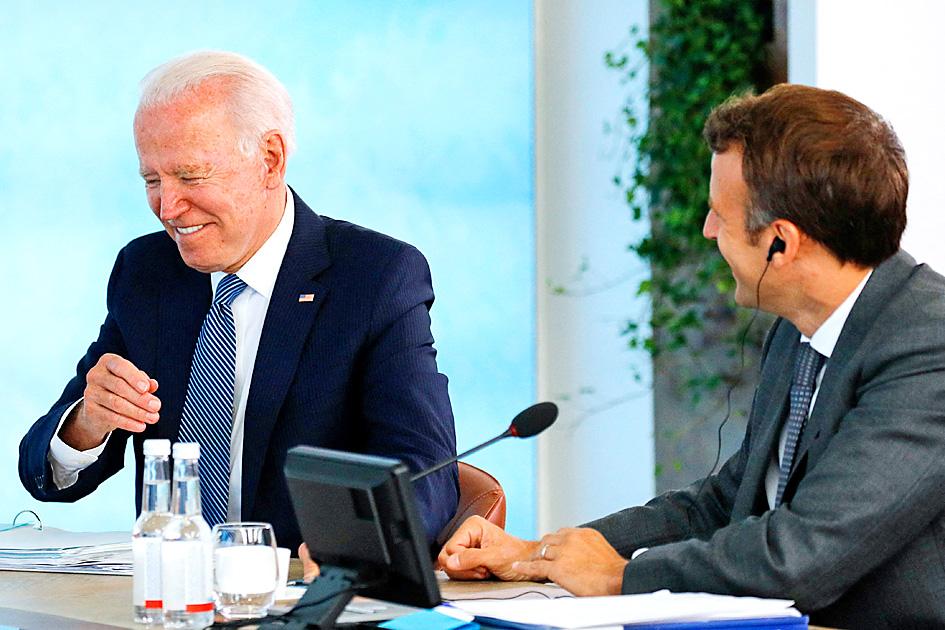World leaders’ criticism of China is part of a concerted global effort to safeguard vital shipping lanes in the Indo-Pacific region and is a boost for Taiwan, academics said after the G7 issued a call for peace across the Taiwan Strait.
The G7 leaders issued a joint communique from Cornwall, England, after their meeting on Sunday saying: “We underscore the importance of peace and stability across the Taiwan Strait, and encourage the peaceful resolution of cross-Strait issues.”
The leaders remain “seriously concerned about the situation in the East and South China Seas and strongly oppose any unilateral attempts to change the status quo and increase tensions,” they said.

Photo: AFP
Prospect Foundation executive director Lai I-chung (賴怡忠) on Monday said that the international community’s attention on the Strait can be gauged by the “institutionalized expressions of concern” that were on display at the G7 meeting.
The communique is the latest in a series of statements by world leaders to emphasize the importance of peace and stability across the Strait, which stemmed from the US and Japan mobilizing allies in the region, Lai said.
The participation of other nations in the formerly strategic framework of Taiwan, the US and China have upturned the underlying assumptions that governed the interactions over the Strait, he said.
The argument that Taiwan should hedge its bets between the US and China by purposeful ambiguity ceases to be viable when other nations, including Japan, Australia, India and EU members, have clearly staked out their positions, he added.
The joint communique shows China that it cannot count on isolating the US in a future confrontation, Lai said, adding that joint communiques are strong, binding agreements that cannot be easily walked back from.
The communique is evidence of established custom and usage that creates the basis of international law, which in turn could serve as a powerful security guarantee for Taiwan, Institute of National Policy chief executive Kuo Yu-jen (郭育仁) said.
The G7 leaders made their reference to Taiwan in the broader context of concern for the rule-based international order in the South China Sea, East China Sea and, by extension, the Indo-Pacific region, Kuo said.
The US’ consensus-building strategy is to bundle Taiwan with maritime disputes surrounding China, and it has proved successful in bringing together the G7, he said.
Meanwhile, Beijing’s efforts to warn the leaders not to criticize China in the joint communique had clearly ended in failure, he added.
“Every reference to China in the communique has been about bad things, including investigating the source of COVID-19, unfair trade practices, issues in Xinjiang and Hong Kong, and seeking to unilaterally change the status quo,” Kuo said.

Taiwan is stepping up plans to create self-sufficient supply chains for combat drones and increase foreign orders from the US to counter China’s numerical superiority, a defense official said on Saturday. Commenting on condition of anonymity, the official said the nation’s armed forces are in agreement with US Admiral Samuel Paparo’s assessment that Taiwan’s military must be prepared to turn the nation’s waters into a “hellscape” for the Chinese People’s Liberation Army (PLA). Paparo, the commander of the US Indo-Pacific Command, reiterated the concept during a Congressional hearing in Washington on Wednesday. He first coined the term in a security conference last

Prosecutors today declined to say who was questioned regarding alleged forgery on petitions to recall Democratic Progressive Party (DPP) legislators, after Chinese-language media earlier reported that members of the Chinese Nationalist Party (KMT) Youth League were brought in for questioning. The Ministry of Justice Investigation Bureau confirmed that two people had been questioned, but did not disclose any further information about the ongoing investigation. KMT Youth League members Lee Hsiao-liang (李孝亮) and Liu Szu-yin (劉思吟) — who are leading the effort to recall DPP caucus chief executive Rosalia Wu (吳思瑤) and Legislator Wu Pei-yi (吳沛憶) — both posted on Facebook saying: “I

The Ministry of Economic Affairs has fined Taobao NT$1.2 million (US$36,912) for advertisements that exceed its approved business scope, requiring the Chinese e-commerce platform to make corrections in the first half of this year or its license may be revoked. Lawmakers have called for stricter enforcement of Chinese e-commerce platforms and measures to prevent China from laundering its goods through Taiwan in response to US President Donald Trump’s heavy tariffs on China. The Legislative Yuan’s Finance Committee met today to discuss policies to prevent China from dumping goods in Taiwan, inviting government agencies to report. Democratic Progressive Party Legislator Kuo Kuo-wen (郭國文) said

Sung Chien-liang (宋建樑), who led efforts to recall Democratic Progressive Party (DPP) Legislator Lee Kun-cheng (李坤城), was released on bail of NT$80,000 today amid outcry over his decision to wear a Nazi armband to questioning the night before. Sung arrived at the New Taipei District Prosecutors’ Office for questioning in a recall petition forgery case last night wearing a red armband bearing a swastika, carrying a copy of Adolf Hitler’s Mein Kampf and giving a Nazi salute. Sung left the building at 1:15am without the armband and covering the book with his coat. Lee said today that this is a serious